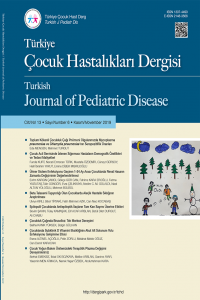Abstract
Amaç: Dünya genelinde, akut alt solunum yolu enfeksiyonları çocukluk çağının en sık ölüm nedenlerinden biridir. D vitamini immünmodulatör bir moleküldür. Düşük serum D vitamini düzeyi, artmış akut alt solunum yolu enfeksiyon riski ile ilişkili olabilir. Çalışmada, hastanede yatan çocuklarda D vitamini eksikliği ile akut alt solunum yolu enfeksiyonu arasındaki ilişki değerlendirildi.
Gereç ve Yöntemler: Çalışma, Ocak 2016-Nisan 2017 tarihlerinde, 1-6 yaş arasındaki, 26 hasta ve 26 kontrol grubu olmak üzere toplam 52 çocuk üzerinde yapıldı. Dışlama kriterleri; tekrarlayan akciğer enfeksiyonu, akciğer tüberkülozu, aspirasyon pnömonisi, kalp anomalisi, prematürite, nörolojik hastalık veya diğer kronik hastalıklar ve rikets idi. Kontrol grubu benzer yaş ve cinsiyetteki sağlıklı çocuklardan oluşturuldu. Hasta ve kontrol gruplarının ortalama serum 25(OH)D düzeyleri karşılaştırıldı.
Bulgular: Akut alt solunum yolu enfeksiyonu olan hastalarda kontrol grubuna göre ortalama 25(OH)D düzeyleri anlamlı derecede daha düşük idi (Sırasıyla 19.76±10 ng/ml ve 29.42±14 ng/ml; p=0.009). 25(OH)D düzeyi, hasta grubunda %65 (n:17), kontrol grubunda ise %15 (n:4) oranında ≤20 ng/ml saptandı. İki hasta çocuk yoğun bakım ünitesinde izlendi ve D vitamin düzeyleri ≤20 ng/ml idi.
Sonuç: Subklinik D vitamin eksikliği çocuklarda akut alt solunum yolu enfeksiyonu gelişimi açısından önemli risk faktörüdür. Alt solunum yolu enfeksiyonu olgularında 25(OH)D vitamini düzeyleri bakılabilir. Serum 25(OH)D düzeyi ≤20 ng/ ml ise D vitamini desteği düşünülebilir.
Keywords
References
- 1. Bikle DD. Vitamin D regulation of immune function. Vitamins & Hormones. 86: Elsevier, 2011:1-21.
- 2. Kearns MD, Alvarez JA, Seidel N, Tangpricha V. Impact of vitamin D on infectious disease. Am J Med Sci 2015;349:245-62.
- 3. Balla B, Tóbiás B, Kosa J, Podani J, Horváth P, Nagy Z, et al. Vitamin D-neutralizing CYP24A1 expression, oncogenic mutation states and histological findings of human papillary thyroid cancer. J Endocrinol Invest 2015;38:313-21.
- 4. Walker VP, Modlin RL. The vitamin D connection to pediatric infections and immune function. Pediatr Res 2009;65:106R-13R.
- 5. Lu M, Taylor BV, Körner H. Genomic effects of the vitamin D receptor: Potentially the link between vitamin D, immune cells, and multiple sclerosis. Front Immunol 2018;9:477.
- 6. Bouillon R, Carmeliet G, Verlinden L, van Etten E, Verstuyf A, Luderer HF, et al. Vitamin D and human health: Lessons from vitamin D receptor null mice. Endoc Rev 2008;29:726-76.
Abstract
References
- 1. Bikle DD. Vitamin D regulation of immune function. Vitamins & Hormones. 86: Elsevier, 2011:1-21.
- 2. Kearns MD, Alvarez JA, Seidel N, Tangpricha V. Impact of vitamin D on infectious disease. Am J Med Sci 2015;349:245-62.
- 3. Balla B, Tóbiás B, Kosa J, Podani J, Horváth P, Nagy Z, et al. Vitamin D-neutralizing CYP24A1 expression, oncogenic mutation states and histological findings of human papillary thyroid cancer. J Endocrinol Invest 2015;38:313-21.
- 4. Walker VP, Modlin RL. The vitamin D connection to pediatric infections and immune function. Pediatr Res 2009;65:106R-13R.
- 5. Lu M, Taylor BV, Körner H. Genomic effects of the vitamin D receptor: Potentially the link between vitamin D, immune cells, and multiple sclerosis. Front Immunol 2018;9:477.
- 6. Bouillon R, Carmeliet G, Verlinden L, van Etten E, Verstuyf A, Luderer HF, et al. Vitamin D and human health: Lessons from vitamin D receptor null mice. Endoc Rev 2008;29:726-76.
Details
| Primary Language | Turkish |
|---|---|
| Subjects | Internal Diseases |
| Journal Section | ORIGINAL ARTICLES |
| Authors | |
| Publication Date | December 23, 2019 |
| Submission Date | June 25, 2018 |
| Published in Issue | Year 2019 Volume: 13 Issue: 6 |
The publication language of Turkish Journal of Pediatric Disease is English.
Manuscripts submitted to the Turkish Journal of Pediatric Disease will go through a double-blind peer-review process. Each submission will be reviewed by at least two external, independent peer reviewers who are experts in the field, in order to ensure an unbiased evaluation process. The editorial board will invite an external and independent editor to manage the evaluation processes of manuscripts submitted by editors or by the editorial board members of the journal. The Editor in Chief is the final authority in the decision-making process for all submissions. Articles accepted for publication in the Turkish Journal of Pediatrics are put in the order of publication, with at least 10 original articles in each issue, taking into account the acceptance dates. If the articles sent to the reviewers for evaluation are assessed as a senior for publication by the reviewers, the section editor and the editor considering all aspects (originality, high scientific quality and citation potential), it receives publication priority in addition to the articles assigned for the next issue.
The aim of the Turkish Journal of Pediatrics is to publish high-quality original research articles that will contribute to the international literature in the field of general pediatric health and diseases and its sub-branches. It also publishes editorial opinions, letters to the editor, reviews, case reports, book reviews, comments on previously published articles, meeting and conference proceedings, announcements, and biography. In addition to the field of child health and diseases, the journal also includes articles prepared in fields such as surgery, dentistry, public health, nutrition and dietetics, social services, human genetics, basic sciences, psychology, psychiatry, educational sciences, sociology and nursing, provided that they are related to this field. can be published.


